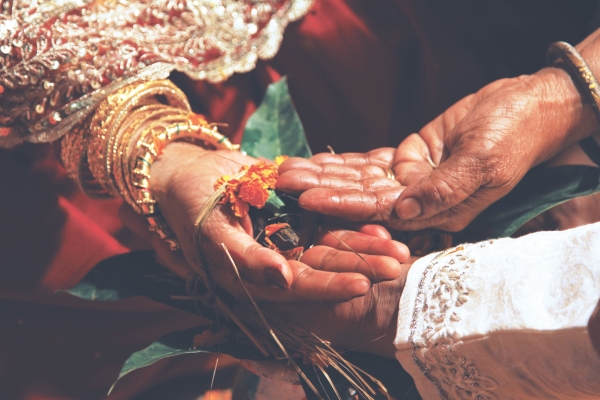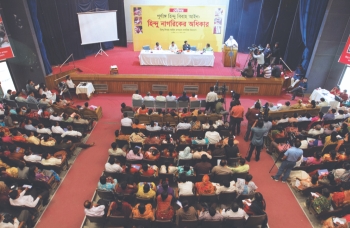| Home - Back Issues - The Team - Contact Us |
 |
| Volume 11 |Issue| 15 | April 13, 2012 | |
|
|
Human Rights
Till Death do us Part How much of the draft Hindu Marriage Law 2011 will be implemented remains a matter of concern Sharmin Ahmed For 20 long years, Kanon Bala Das from Kaliganj, Gazipur was married to a man who suddenly disclaimed her and her two children to marry another woman. As there are no laws for the Hindus to register or have any official document during marriage, Kanon Bala, who was married off as per Hindu traditions, can neither prove her marriage and file for a divorce nor take any legal help. Her children face questions regarding their identities especially when they need to fill in forms to sit for exams. Because of the stigma surrounding her, Kanon's parents have also disclaimed her and her children. As she narrates her sad plight at a Seminar titled, "Full-fledged Hindu marriage law: Hindu citizens' rights" organised by Hindu Bibaho Ain Pronoyone Nagorik Uddog in association with Manusher Jonno Foundation (MJF) at BIAM auditorium, she wails, "Where should I go? To a brothel? Because the stigma I face is just as debasing as belonging to one? He can disown me and marry again but I cannot because there is no scope for divorce or a remarriage that can be secured through registration." On that note, Advocate Rabindranath Bishas from Norail commented, "Given that there are no laws regarding registration, divorce and property rights of the Hindus, we cannot provide any legal advice and assistance. There has been a case of a woman who had married again, however she has no legal papers, so she cannot divorce her first husband and cannot legalise her second marriage." However this is not the only problem that the Bangladeshi Hindu women face in their day to day lives. Torulota Rai from Nilphamary, who now lives in Rangpur at a skill development centre, tells the most heart rending of tales. She was married off at 13 years of age, a year later she gave birth to a boy. Meanwhile, her husband convinced her mother to entitle him to all her family property. Eventually when there was nothing else to take from her and her family, he left her and married another woman. Not only has he rid her off all her property and disowned her, but he is now threatening to take away her only son, hence she had to hide the boy away at her uncle's house. Because there is no law for the protection of Hindu women, she cannot take any legal help either. "I have given up hopes for my marriage and property but I want to keep my son, I do not want him to bear his father's name, I want him to bear my name but there are no laws or acts to grant me that."
Shaheen Anam, executive director of MJF said, "For a long time various rights based organisations have been working to ensure the rights of the Hindu minority, this seminar is a part of that movement”. In the early 80s Sufia Kamal of Bangladesh Mohila Parishad and many progressive lawyers under the leadership of Justice Debesh Bhattacharya began their work to reform the conventional Hindu law, discussing it with lawyers, social-scientists and others who are directly involved with the problem. The MJF later conducted surveys of its own in various places across the country. The aim was to find and record effects of the lack of laws on Hindu marriage registration, divorce and polygamy on the women and their children. Eventually 10 Non-governmental organisations that deal with women and human rights issues and a few individuals came up with a 'Hindu Marriage Draft Law 2011' which was presented to the Ministry of law. The seminar has been organised to discuss the draft with the general people. Barrister Shafiq Ahmed, minister of Law, Justice and Parliamentary Affairs, who was the chief guest at the seminar, said, "I have been an avid supporter of the Hindu Marriage law from a long time. However, as the Government have stated, it will not pass any law that is confrontational with religion. The Hindu Marriage registration law will be passed but the divorce and property laws will require further investigation and review." He hastened to add that the government has discussed the matter with legal experts, Hindu scholars, and lawyers for formulating a Hindu marriage registration law, after which there was an outburst from the audience, majority of whom were women, “The state must do its duty!” The Minister, however, remained firm on his opinion. Rakhi Das Purokayostho, organising Secretary of Bangladesh Mohila Parishad said, “It is often the case that when women's right is the issue, religion is brought into it: a woman always faces questions of virtues and righteousness. This is why it is necessary that the state be involved to ensure these basic rights.” According to the draft, a man or a woman can file for various reasons including: change of religion by either the husband or wife, violence, physical or mental illness and if the husband or wife has been absconding for at least four years. The seminar also demanded that there should be punishment for breaching the registration law, for instance a fixed amount of fine or jail time. One of the lawyers present at the programme asked if the Act of Declaration of Gift which allows one to bequest their daughters with property for a Tk 100 court fee, can be applied for Hindus as well. The law minister on that note has said the government will also make a separate law so that the Hindus, Buddhists and Christians can make 'Declaration of Gift' on a Tk100 court fee like their Muslim counterparts. He also mentioned that the government has already formed tribunals at district level to deal with the vested properties in order to protect the rights of the religious minority over their lands. The tribunals will also take measures to return the lands to their original owners upon receiving applications. It is clear from the law minister's comments that – if the state refuses to address issues that affect religious sentiments – the draft to be passed will take longer than it should as property rights and divorce rites are problematic issues to deal with.
|
||||
Copyright
(R) thedailystar.net 2012 |

